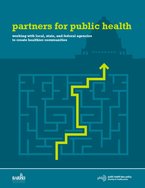0
Report
Community: Youth
Dec 1, 2020
420,000.
Based on the new report, "Lost in the Masked Shuffle & Virtual Void: Children and Youth Experiencing Homelessness Amidst the Pandemic" from SchoolHouse Connection and Poverty Solutions at the University of Michigan, that’s how many fewer children and youth experiencing homelessness have been identified and enrolled by schools so far this school year.
According to our data and insights - gathered from educators and homeless liaisons across 49 states - the number of children, youth, and families experiencing homelessness has likely increased due to the economic crisis. Yet, because of COVID-19 challenges in identifying children and youth experiencing homelessness, hundreds of thousands may not be getting the education and support they need - from internet access, to housing, to food, to child care.
What’s more, only 18% of respondents indicated that federal coronavirus relief education funding provided by the CARES Act is being used to meet the needs of students experiencing homelessness.
To break generational cycles of homelessness, we must take swift action to support the increasing number of children, youth, and families in need. Check out our report to learn more and take action. We have included recommendations for Congressional leaders, state and local educational agencies, homeless, housing, food, and other relief agencies, and philanthropic organizations.
Authored by: Poverty Solutions at THE UNIVERSITY OF MICHIGAN & SCHOOLHOUSE CONNECTION
Topics: Attendance, Child welfare, Early childhood, Education, Funding, Health, Homelessness, Low-income, Stability, Youth
 Shared by Housing Is
Shared by Housing Is
Housing Is posted a
on Dec 1, 2020
Poverty Solutions at THE UNIVERSITY OF MICHIGAN & SCHOOLHOUSE CONNECTION
0
Publication
Community:
Jan 24, 2019
Affordable housing campaigns are not new, of course, but what is unprecedented and transformative about Opportunity Starts at Home is the scope and diversity of the partners that are joining forces to advocate for more robust and equitable federal housing policies. The campaign is advised by a Steering Committee including leading national organizations representing a wide range of interests that are working shoulder-to-shoulder to solve the affordable housing crisis.
Authored by: Opportunity Starts at Home
Topics: Asset building, Child welfare, CLPHA, Community development, Early childhood, Education, Food insecurity, Funding, Health, Homelessness, Housing, Immigrants, Legislation & Policy, Low-income, Mobility, Out-of-school time, Partnerships, Racial inequalities, Safety, Seniors, Stability, Substance abuse, Youth
 Shared by Mica O'Brien
Shared by Mica O'Brien
Mica O'Brien posted a
on Jan 24, 2019
Opportunity Starts at Home
Affordable housing campaigns are not new, of course, but what is unprecedented and transformative about Opportunity Starts at Home is the scope and diversity of the partners that are joining forces to advocate for more robust and equitable federal housing policies.
0
News Article
Community:
Dec 12, 2018
Lily, a character introduced seven years ago to address child hunger, returns. This time her family does not have a place to live.
Authored by: Nikita Stewart for The New York Times
Topics: Child welfare, Education, Homelessness, Housing, Stability, Youth
 Shared by Mica O'Brien
Shared by Mica O'Brien
Mica O'Brien posted a
on Dec 12, 2018
Nikita Stewart for The New York Times
Lily, a character introduced seven years ago to address child hunger, returns. This time her family does not have a place to live.
0
Research
Community:
Nov 27, 2018
Most states use an education funding formula to allocate state and local dollars to school districts. Most funding formulas attempt to account for student poverty, among other factors, in distributing funds. But there are several ways to count low-income students and even more ways to tie dollars to these student counts.
Authored by: Kristin Blagg for The Urban Institute
Topics: Child welfare, Education, Legislation & Policy, Low-income, Place-based, Research, Stability, Youth
 Shared by Mica O'Brien
Shared by Mica O'Brien
Mica O'Brien posted a
on Nov 27, 2018
Kristin Blagg for The Urban Institute
Most states use an education funding formula to allocate state and local dollars to school districts. Most funding formulas attempt to account for student poverty, among other factors, in distributing funds.
0
Report
Community:
Oct 24, 2018
CLPHA’s Housing Is Initiative is engaged in a number of cross-sector activities focused on developing partnerships, facilitating a community of practice, resource development, promoting best practices, online collaboration, policy and advocacy, and training and education. Read about recent activities in this Fall Update.
Authored by:
Topics: Child welfare, CLPHA, Community development, Cost effectiveness, Data sharing, Early childhood, Education, Family engagement, Funding, Health, Homelessness, Housing, Low-income, Medicaid / Medicare, Mental health, Partnerships, Place-based, Post-secondary, Research, Stability, Substance abuse, Workforce development, Youth
 Shared by Mica O'Brien
Shared by Mica O'Brien
Mica O'Brien posted a
on Oct 24, 2018
CLPHA’s Housing Is Initiative is engaged in a number of cross-sector activities focused on developing partnerships, facilitating a community of practice, resource development, promoting best practices, online collaboration, policy and advocacy, and training and education.
0
Interactive
Community:
Which neighborhoods in America offer children the best chance to rise out of poverty? The Opportunity Atlas answers this question using anonymous data following 20 million Americans from childhood to their mid-30s. Now you can trace the roots of today's affluence and poverty back to the neighborhoods where people grew up. See where and for whom opportunity has been missing, and develop local solutions to help more children rise out of poverty.
Authored by: Census Bureau, Harvard University, and Brown University
Topics: Asset building, Child welfare, Dual-generation, Early childhood, Education, Health, Housing, Low-income, Mobility, Stability, Youth
 Shared by Housing Is
Shared by Housing Is
Housing Is posted a
on Oct 12, 2018
Census Bureau, Harvard University, and Brown University
Which neighborhoods in America offer children the best chance to rise out of poverty? The Opportunity Atlas answers this question using anonymous data following 20 million Americans from childhood to their mid-30s.
0
Interactive
Community:
Aug 20, 2018
Enhance your knowledge around family homelessness and the McKinney-Vento Homelessness Assistance Act's definition of "homeless" as it refers to children and youth. Review other relevant federal regulations for Head Start, Early Head Start, and Child Care and Development Fund (CCDF)-subsidized programs.
This interactive learning series is intended for professionals in Head Start, Early Head Start, and child care, including early childhood and school-age child care providers, CCDF Lead Agency or designated entity staff, and other key stakeholders. Learn how to identify families experiencing homelessness, conduct community outreach, and much more.
Authored by: U.S. Department of Health and Human Services, Administration for Children and Families
Topics: Child welfare, Early childhood, Education, Family engagement, Grade-level proficiency, Homelessness, Housing, Low-income, Stability
 Shared by Mica O'Brien
Shared by Mica O'Brien
Mica O'Brien posted a
on Oct 10, 2018
U.S. Department of Health and Human Services, Administration for Children and Families
Enhance your knowledge around family homelessness and the McKinney-Vento Homelessness Assistance Act's definition of "homeless" as it refers to children and youth.
0
Publication
Community:
Jul 13, 2018
This guide is intended to provide information to public health department staff and advocates about the many public agencies that make policy decisions and implement projects related to the physical environment.
Authored by:
Topics: Child welfare, Community development, Education, Exercise, Green, Health, Housing, Legislation & Policy, Place-based, Safety, Smoke-free, Stability, Substance abuse, West Coast
 Shared by Housing Is
Shared by Housing Is
Housing Is posted a
on Jul 13, 2018
This guide is intended to provide information to public health department staff and advocates about the many public agencies that make policy decisions and implement projects related to the physical environment.
0
Report
Community:
Jul 12, 2018
We examined the influence of maternal health literacy on child participation in social welfare programs. In this cohort, 20% of the mothers had inadequate or marginal health literacy. Initially, more than 50% of the families participated in Temporary Assistance for Needy Families (TANF), the Food Stamp Program, and Special Supplemental Nutrition Program for Women, Infants, and Children, whereas fewer than 15% received child care subsidies or public housing. In multivariate regression, TANF participation was more than twice as common among children whose mothers had adequate health literacy compared with children whose mothers had inadequate health literacy
Authored by:
Topics: Child welfare, Dual-generation, Early childhood, Education, Family engagement, Food insecurity, Health, Housing, Low-income, Medicaid / Medicare, Nutrition, Pre-natal, Preventative care, Research, Stability
 Shared by Housing Is
Shared by Housing Is
Housing Is posted a
on Jul 12, 2018
We examined the influence of maternal health literacy on child participation in social welfare programs. In this cohort, 20% of the mothers had inadequate or marginal health literacy.
0
Interactive
Community:
Jul 12, 2018
How does housing affect your family's well-being?
Authored by: How Housing Matters
Topics: Asset building, Asthma, Child welfare, Early childhood, Education, Health, Housing, Stability
 Shared by Housing Is
Shared by Housing Is
Housing Is posted a
on Jul 12, 2018
How does housing affect your family's well-being?
0
Report
Community:
Jul 11, 2018
To help inform policymakers and move policy forward, this paper discusses the current state of housing in the United States, provides a conceptual framework for housing as a platform to improve educational outcomes for children, reviews the existing evidence that supports conceptual models, and identifies the major gaps in research. Finally, it proposes a list of projects that make up a research agenda for understanding the issue and guiding investments in new research.
Authored by:
Topics: Attendance, Child welfare, Early childhood, Education, Housing, Literacy, Low-income, Mental health, Post-secondary, Preventative care, Racial inequalities, Research, Safety, Stability, Youth
 Shared by Housing Is
Shared by Housing Is
Housing Is posted a
on Jul 11, 2018
To help inform policymakers and move policy forward, this paper discusses the current state of housing in the United States, provides a conceptual framework for housing as a platform to improve educational outcomes for children, reviews the existing evidence that supports conceptual models, and iden
0
Policy Brief
Community:
Jul 10, 2018
Children’s HealthWatch's brief "asks two straightforward questions: If health starts at home, what are the healthcare and educational costs of unstable housing? Which policy solutions could create stable homes for healthier families?"
Authored by: Children's Health Watch
Topics: Asthma, Child welfare, Dental, Early childhood, Education, Foster care, Grade-level proficiency, Health, Healthy homes, Housing, Lead, Literacy, Low-income, Medicaid / Medicare, Obesity, Partnerships, Pre-natal, Preventative care, Racial inequalities, School-readiness, Stability, Vision, Youth
 Shared by Steve Lucas
Shared by Steve Lucas
Steve Lucas posted a
on Jul 10, 2018
Children’s HealthWatch's brief "asks two straightforward questions: If health starts at home, what are the healthcare and educational costs of unstable housing? Which policy solutions could create stable homes for healthier families?"
0
News Article
Community:
Dec 11, 2017
Authored by: Elizabeth A. Harris for The New York Times
Topics: Attendance, Child welfare, East Coast, Education, Grade-level proficiency, Homelessness, Housing, Legislation & Policy, Low-income, Metrics, Out-of-school time, Racial inequalities, Research, School-readiness, Stability, Youth
 Shared by Housing Is
Shared by Housing Is
Housing Is posted a
on Jul 5, 2018
Elizabeth A. Harris for The New York Times
0
Report
Community:
Nov 1, 2017
Why do some neighborhoods appear able to launch effective local improvement initiatives, while others are more hampered by fragmentation and mistrust? Why can some communities mobilize diverse constituencies to influence public policy, while others cannot? Answers to these questions may be found in the specific patterns of collaboration that form among community organizations, and between these groups, schools, public agencies, and elected officials, according to MDRC, a preeminent social-policy research organization.
Authored by: MDRC
Topics: Asset building, Child welfare, Community development, Data sharing, Dual-generation, Education, Family engagement, Funding, Health, Housing, Legislation & Policy, Low-income, Metrics, Midwest, Mobility, Out-of-school time, Partnerships, Place-based, Preventative care, Research, Safety, Stability, Workforce development, Youth
 Shared by Mica O'Brien
Shared by Mica O'Brien
Mica O'Brien posted a
on Jun 29, 2018
Why do some neighborhoods appear able to launch effective local improvement initiatives, while others are more hampered by fragmentation and mistrust? Why can some communities mobilize diverse constituencies to influence public policy, while others cannot?
1
Video
Community:
May 23, 2018
The Council of Large Public Housing Authorities (CLPHA) hosted The Housing Is Summit in Washington, D.C., on May 3-4, 2018 with 300 partners across the housing, education, and healthcare sectors. Access video recordings of the Summit's keynote speakers (HUD Secretary Ben Carson, John Bridgeland, Matthew Morton), plenary panels (on topics that cut across sectors like anchor institutions, data collaboration, stability, and foundation investments), and select breakout sessions focused on the intersections of housing, education, and health.
Authored by: Council of Large Public Housing Authorities
Topics: Affordable Care Act, Attendance, Child welfare, CLPHA, Community development, Data sharing, Dual-eligibles, Dual-generation, Early childhood, Education, Funding, Grade-level proficiency, Health, Healthy homes, Homelessness, Housing, Legislation & Policy, Low-income, Medicaid / Medicare, Mental health, Metrics, MTW, Out-of-school time, Partnerships, Place-based, Preventative care, Racial inequalities, Research, School-readiness, Seniors, Stability, Substance abuse, Supportive housing, Sustainability, TA, Workforce development, Youth
 Shared by Steve Lucas
Shared by Steve Lucas
Steve Lucas posted a
on May 23, 2018
The Council of Large Public Housing Authorities (CLPHA) hosted The Housing Is Summit in Washington, D.C., on May 3-4, 2018 with 200 partners across the housing, education, and healthcare sectors. The Summit highlighted the ways that we can transform systems to better serve low-income people with two days of plenary speakers/panels, breakout sessions, and caucus discussions geared toward intersectional thinking and ways to take action.
Council of Large Public Housing Authorities
The Council of Large Public Housing Authorities (CLPHA) hosted The Housing Is Summit in Washington, D.C., on May 3-4, 2018 with 300 partners across the housing, education, and healthcare sectors.
 Shared by Housing Is
on Dec 1, 2020
Shared by Housing Is
on Dec 1, 2020


 Shared by Housing Is
on Oct 12, 2018
Shared by Housing Is
on Oct 12, 2018
 Shared by Housing Is
on Jul 13, 2018
Shared by Housing Is
on Jul 13, 2018
 Shared by Housing Is
on Jul 12, 2018
Shared by Housing Is
on Jul 12, 2018
 Shared by Housing Is
on Jul 12, 2018
Shared by Housing Is
on Jul 12, 2018
 Shared by Housing Is
on Jul 11, 2018
Shared by Housing Is
on Jul 11, 2018
 Shared by Steve Lucas
on Jul 10, 2018
Shared by Steve Lucas
on Jul 10, 2018
 Shared by Housing Is
on Jul 5, 2018
Shared by Housing Is
on Jul 5, 2018


 Shared by Steve Lucas
on May 23, 2018
Shared by Steve Lucas
on May 23, 2018







